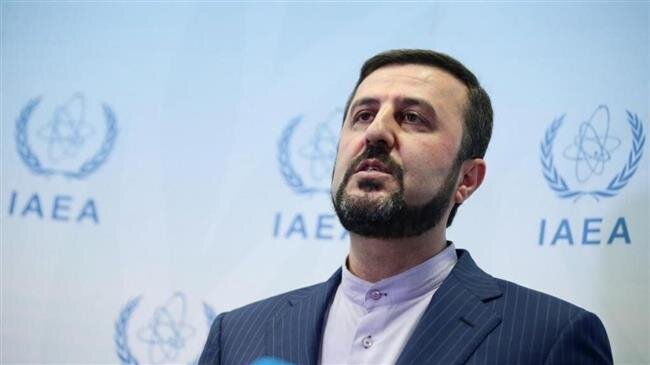Envoy says IAEA report on cameras of the Tesa Complex in Karaj ‘inaccurate’

TEHRAN - Iran's ambassador to the Vienna-based international organizations has said the report by the International Atomic Energy Agency (IAEA) director-general on the cameras of the Tesa Complex in Karaj is inaccurate and goes beyond the understandings reached in a joint statement by the Atomic Energy Organization of Iran (AEOI) and the IAEA.
The remarks by Ambassador Kazem Gharibabadi came after Sunday night's report by the IAEA Director-General Rafael Grossi on Iran's refusal to re-install surveillance cameras at the Tesa Complex in Karaj, IRNA reported on Monday.
"It is deeply unfortunate that after three terrorist sabotage operations at the facility over the past year, the IAEA has not yet condemned these heinous acts, contrary to numerous resolutions of the IAEA General Conference and the UN General Assembly, and even because of its equipment and assets and the safety and security of its inspectors," Gharibabadi tweeted on Sunday.
He added that any decision by Iran regarding the IAEA monitoring equipment is “only based on political rather than legal considerations”, therefore, the IAEA cannot and should not assert its rights in this regard.
Gharibabadi highlighted: "The joint statement of the head of the Atomic Energy Organization of Iran and the director-general of the IAEA on September 12 was also obtained in good faith of Iran and with the aim of replacing the ‘specified equipment’ memory cards. The Agency also took action to implement this goal from September 20 to 22."
During the talks in Tehran and recently in Vienna, it was clearly stated that since the security and judicial investigations into the Tesa complex in Karaj are still ongoing, the monitoring equipment of this complex will not be under technical service, the ambassador added.
That is why the term "specified equipment" was used in the joint statement, he said.
Therefore, Gharibabadi underlined, the IAEA Director-General's September 26 report “isn’t accurate and goes beyond the agreed terms” of the joint statement.
Iran had vetoed the IAEA’s request to have “full” access to the footages and memory cards of the nuclear sites. In December 2020, the Iranian parliament passed the generalities of a bill titled “Strategic Action to Lift Sanctions.”
The bill requires the government to raise uranium enrichment levels to 20% and install advanced centrifuges.
According to the 9-article bill, the AEOI will be required to produce and store at least 120 kilograms of enriched uranium with 20 percent purity at the Fordow nuclear facility every year, and to fulfill the country’s peaceful industrial demands with uranium enriched above 20%.
The bill entails uranium enrichment activities with at least 1,000 IR-2M centrifuge machines at the Natanz nuclear plant within three months after the ratification of the law and compels the AEOI to launch uranium enrichment as well as research and development activities with at least 164 IR-6 centrifuges and increase the number of centrifuge machines to 1,000 within a year after the ratification of the bill.
The bill also requires the government to suspend the voluntary implementation of the Additional Protocol to the nuclear Non-Proliferation Treaty (NPT) three months after the ratification of it if the parties to the nuclear deal between Iran and world powers, officially known as the Joint Comprehensive Plan of Action (JCPOA), failed to uphold their obligations under the agreement.
Leave a Comment